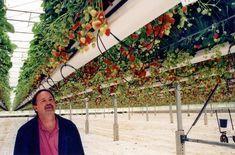
For Peter Wensak strawberries are an unashamed passion. So it comes as quite a surprise to learn that before the nineties he was a substantial salad producer in Essex.
Over the past nine years, he has become one of the most respected names in the industry, evidenced by the numerous quality awards for his fruit, all proudly displayed in the entrance of the modest offices which are the headquarters of Polhouse Nurseries.
Once he had decided that strawberries were his forte, after taking over from his father in 1979, he chose to become one of the few specialists in glasshouse production.
Polhouse - with its red and white colouring reflecting Wensak’s Polish ancestry - has subsequently expanded to three different sites - 10 acres at Lawford, nine at Hempnall and five at Matham, in Norfolk.
Growing three crops a year of mainly Elsanta, using the Dutch suspended trough system, this season he expects to market 1.2 million kilograms of fruit through the Summer Fruit Company to the major multiples.
And there is further expansion on the horizon as well, with a £1m investment to add a further five acres of glass at Lawford underway, with the aim of being in production by 2006.
This expansion will raise Wensak’s potential to around 1.5m kgs, making him the largest protected grower under glass in the industry.
“We are already in production 60 weeks of the year,” he jokes, walking round the houses where very clean, well-sized berries hang down like bunches of grapes, producing around six kgs per metre.
The cycle is achieved by the plants, imported from Holland and Belgium for the summer crop, spending some time in the open during May, prior to planting under glass. These crop from early July into August.
At the same time more plants are being prepared for the end of the month, which, with the later help of heat and light, will fruit between October and November.
These then remain in situ, and will flower and fruit again the following April and May.
Certainly there is very little time during the year when the nurseries are dormant. There are 35 full-time employees, including specialists whose role is focused on areas such as ensuring there is always full traceability and forward planning, plus the crop information required almost daily by the customer.
A total workforce, of around 150, is also on site virtually year round. One benefit of that is the fact Wensak has been able to develop closely monitored training programmes for newcomers to ensure the standard of picking remains high.
While there are other strawberry varieties constantly coming forward, he remains true to Elsanta, which he still regards as the benchmark for the industry.
“There may be other winners coming over the horizon but Elsanta performs well, although it remains something of a challenge,” he reveals.
He describes the UK’s best known variety as “mystical”, because every crop tends to be marginally different in terms of harvesting dates and quality, simply because of the miniscule variations in each season of light and temperature.
“It means we are always pushing the boundaries and learning to improve,” he adds. “Life is never boring.” This is despite the highly controlled growing conditions where computers have all but taken over.
His confidence in the future is based not just on his ability to be highly professional.
“British strawberries are one of the few crops which are really regarded as special by consumers. There is a great deal of loyalty, and recently we have scored well with the health issue, at a time when the industry is going through a boom period. They make a constant premium over imports, regardless of the time of year.”
However he is convinced that serving fewer larger customers will continue to mean that nurseries must similarly expand to keep pace.
“Growing strawberries under only two acres of glass is already becoming uneconomical at a time when we are all having to drive down costs.”
It is for this reason that all Polhouses fruit is packed under contract at Lawford.
“Running an efficient operation is a specialist job in itself, needing high capital investment. Growers should concentrate on what they know best - which is growing,” Wensak states.
Meanwhile, he still reserves judgement on how international competition will develop.
“Spain is now having problems, not so much with the recent weather, but the escalating costs of labour,” he says.
With his knowledge of Poland does he think that this is a potential source, and one that will put growers like himself under pressure?
“I don’t think so at this stage,” he replies, “It will take quite a time for this industry to reach the levels expected by British retailers and at at the same time, similar to Spain, their costs will also rise.
“We have every intention of keeping ahead for a long while yet.”



